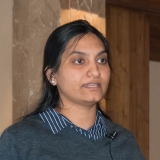The climate sensitivity of electricity demand in India is likely to be highly sensitive to growth in income. Thus, both intensive and extensive adjustments in cooling and heating will play an important role in determining future climate change impacts on electricity demand. This chapter utilizes a national level panel dataset of 28 Indian states for the period 2005-2009 to show that (1) electricity demand is positively related to temperatures in summers and negatively related to temperatures in winters; (2) the effect of temperature increase on demand in summers is higher in a hotter climate as people adapt with the use of higher cooling equipment whereas there is a higher negative response to temperature increase in winters in colder climates as people adapt using higher heating equipment; (3) the effects of both the hotter and the colder climates on electricity demand are expected to be more pronounced at the higher income levels. The preferred estimates indicate that climate change will increase electricity demand by 6.9 percent with 4 percent p.a. GDP growth and 8.6 percent with 6 percent p.a. GDP growth in 2030 over the reference scenario of no climate change. This re ects the fact that the estimated marginal eect of a hotter climate is greater when income is higher. The results suggest that over 50 percent of the climate change impacts will be due to extensive adjustments and that electricity demand models that do not account for extensive adjustments are likely to underestimate the climate change impacts on electricity demand especially in developing countries like India where the current penetration of air- conditioning equipment is very low.
The impact of development on the climate sensitivity of electricity demand in India
EfD Authors
Country
Sustainable Development Goals
